一般现在时用法精讲精练
(完整版)大学一般现在时讲解及练习题
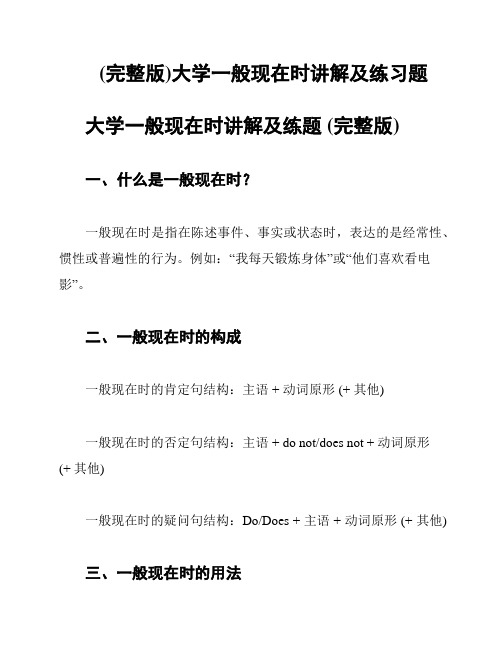
(完整版)大学一般现在时讲解及练习题大学一般现在时讲解及练题 (完整版)一、什么是一般现在时?一般现在时是指在陈述事件、事实或状态时,表达的是经常性、惯性或普遍性的行为。
例如:“我每天锻炼身体”或“他们喜欢看电影”。
二、一般现在时的构成一般现在时的肯定句结构:主语 + 动词原形 (+ 其他)一般现在时的否定句结构:主语 + do not/does not + 动词原形(+ 其他)一般现在时的疑问句结构:Do/Does + 主语 + 动词原形 (+ 其他)三、一般现在时的用法1. 表示客观事实、真理或普遍现象,常常与表示频率的副词一起使用。
例如:“水烧开时会冒泡”。
2. 表示经常性或惯性的行为。
例如:“我每天都喝咖啡”。
3. 表示现阶段的情况或状态。
例如:“我现在住在中国”。
4. 在叙述历史事件或小说情节时,使用一般现在时可以增加紧迫感和现场感。
例如:“他打开门,走进了房间”。
四、一般现在时的练题1. 填入适当的动词形式:- She ____(have) two cats.- They ____(go) to school every day.- My father ____(work) as a doctor.2. 句子改为否定句:- I eat breakfast every morning.- She likes to read books.- We play tennis on weekends.3. 根据题意回答问题:- When do you usually go to bed? - Does he watch TV every evening? - How often does she go shopping?4. 将下列句子改为一般疑问句:- You live in London.- They play football in the park.- She enjoys dancing.五、答案1. 填入适当的动词形式:- She has two cats.has two cats.- They go to school every day.go to school every day. - My father works as a doctor.works as a doctor.2. 句子改为否定句:- I do not eat breakfast every morning.- She does not like to read books.- We do not play tennis on weekends.3. 根据题意回答问题:- I usually go to bed at 11 PM.- Yes, he watches TV every evening.- She goes shopping once a week.4. 将下列句子改为一般疑问句:- Do you live in London?- Do they play football in the park?- Does she enjoy dancing.希望以上内容对你理解和练一般现在时有所帮助!如有任何问题,请随时向我提问。
一般现在时知识点详解及练习(145题 含解析 页)初中英语专题复习
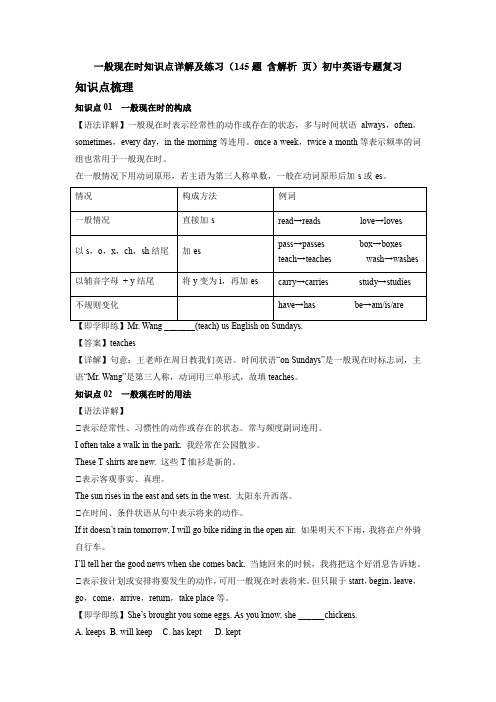
一般现在时知识点详解及练习(145题含解析页)初中英语专题复习知识点梳理知识点01 一般现在时的构成【语法详解】一般现在时表示经常性的动作或存在的状态,多与时间状语always,often,sometimes,every day,in the morning等连用。
once a week,twice a month等表示频率的词组也常用于一般现在时。
在一般情况下用动词原形,若主语为第三人称单数,一般在动词原形后加-s或-es。
【答案】teaches【详解】句意:王老师在周日教我们英语。
时间状语“on Sundays”是一般现在时标志词,主语“Mr. Wang”是第三人称,动词用三单形式,故填teaches。
知识点02 一般现在时的用法【语法详解】①表示经常性、习惯性的动作或存在的状态。
常与频度副词连用。
I often take a walk in the park. 我经常在公园散步。
These T-shirts are new. 这些T恤衫是新的。
①表示客观事实、真理。
The sun rises in the east and sets in the west. 太阳东升西落。
①在时间、条件状语从句中表示将来的动作。
If it doesn’t rain tomorrow, I will go bike riding in the open air. 如果明天不下雨,我将在户外骑自行车。
I’ll tell her the good news when she comes back. 当她回来的时候,我将把这个好消息告诉她。
①表示按计划或安排将要发生的动作,可用一般现在时表将来。
但只限于start,begin,leave,go,come,arrive,return,take place等。
【即学即练】She’s brought you some eggs. As you know, she ______chickens.A. keepsB. will keepC. has keptD. kept【详解】句意:她给你带了些鸡蛋。
英语语法速成一般现在时精讲精练

英语语法速成一般现在时精讲精练一般现在时是英语中最基本的时态之一,用来表示经常性的、重复性的动作,或者客观事实和普遍真理。
在本篇文章中,我们将详细介绍一般现在时的用法,并提供一些相关的练习。
一、第一人称单数和第三人称单数谓语动词的构成在一般现在时中,第一人称单数(I)和第三人称单数(he/she/it)的谓语动词构成方式有所不同。
1. 对于第一人称单数,即I,谓语动词直接采用原形,不需要做任何改变。
例如:I play tennis every Sunday.(我每个星期天打网球。
)2. 对于第三人称单数,即he/she/it,谓语动词在后面加上-s或-es。
具体的变化规则如下:a. 一般情况下,在谓语动词后面加上-s。
例如:She studies English every day.(她每天学英语。
)b. 如果谓语动词以字母s、x、o、ch、sh结尾,那么在后面加上-es。
例如:He watches movies on weekends.(他周末看电影。
)c. 如果谓语动词以辅音字母+y结尾,那么将y改为i,再加上-es。
例如:My dog barks loudly at night.(我的狗晚上叫得很大声。
)二、一般现在时的用法1.表示经常性或习惯性的动作:I often go jogging in the morning.(我经常早上慢跑。
)2.表示客观事实和普遍真理:The sun rises in the east.(太阳从东方升起。
)3.表示现状、感觉或状态:I feel tired after work.(工作后我感到疲劳。
)4.表示固定时间表中的动作:The train always arrives on time.(火车总是准时到达。
)三、一般现在时的练习现在我们来进行一些练习,以巩固对一般现在时的理解。
1. 填入适当的动词形式(第三人称单数):a. He __________ (watch) TV every day.b. The cat __________ (meow) at night.c. Mary __________ (teach) English at a school.d. The sun __________ (shine) in the sky.2. 根据括号中的提示,改写句子:a. She drinks milk every morning.(改为否定句)She ________ ________ milk every morning.b. They play basketball in the park.(改为疑问句)________ they ________ basketball in the park?c. My brother goes swimming on weekends.(改为一般疑问句)________ your brother ________ swimming on weekends?d. We have English class on Monday.(改为否定句)We ________ ________ English class on Monday.(答案)1. a. watches b. meows c. teaches d. shines2. a. doesn't drink b. Do; play c. Does; go d. don't have通过以上练习,希望能够帮助你更好地理解和使用一般现在时。
一般现在时的结构和用法
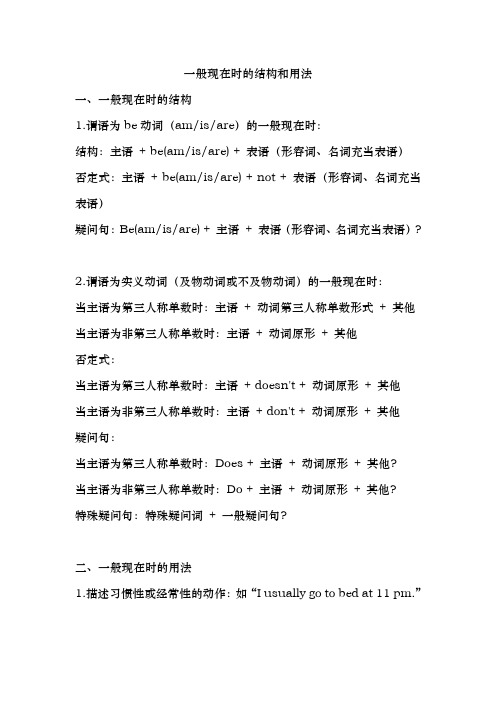
一般现在时的结构和用法
一、一般现在时的结构
1.谓语为be动词(am/is/are)的一般现在时:
结构:主语+ be(am/is/are) + 表语(形容词、名词充当表语)
否定式:主语+ be(am/is/are) + not + 表语(形容词、名词充当表语)
疑问句:Be(am/is/are) + 主语+ 表语(形容词、名词充当表语)?
2.谓语为实义动词(及物动词或不及物动词)的一般现在时:
当主语为第三人称单数时:主语+ 动词第三人称单数形式+ 其他当主语为非第三人称单数时:主语+ 动词原形+ 其他
否定式:
当主语为第三人称单数时:主语+ doesn't + 动词原形+ 其他
当主语为非第三人称单数时:主语+ don't + 动词原形+ 其他
疑问句:
当主语为第三人称单数时:Does + 主语+ 动词原形+ 其他?
当主语为非第三人称单数时:Do + 主语+ 动词原形+ 其他?
特殊疑问句:特殊疑问词+ 一般疑问句?
二、一般现在时的用法
1.描述习惯性或经常性的动作:如“I usually go to bed at 11 pm.”
2.表达客观事实或普遍真理:如“The sun rises in the east.”
3.描述时间表或日程安排:如“The train leaves at 8 am.”
4.在新闻报道或科技文章中描述当前状况:如“The company is developing a new product.”。
一般现在时精讲精练
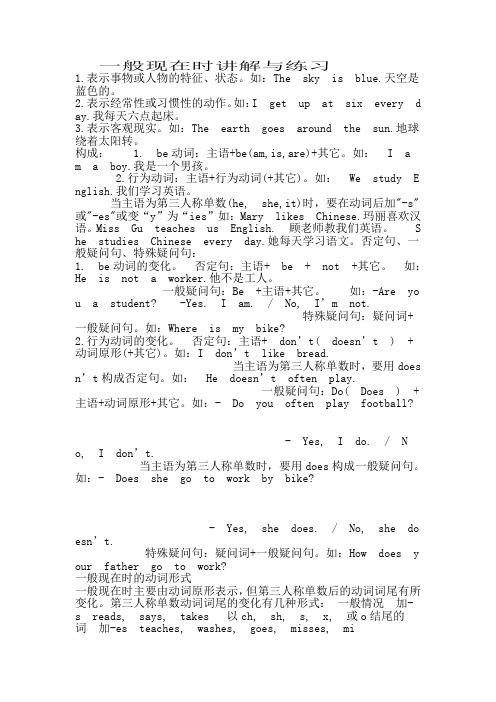
一般现在时讲解与练习1.表示事物或人物的特征、状态。
如:The sky is blue.天空是蓝色的。
2.表示经常性或习惯性的动作。
如:I get up at six every d ay.我每天六点起床。
3.表示客观现实。
如:The earth goes around the sun.地球绕着太阳转。
构成: 1. be动词:主语+be(am,is,are)+其它。
如:I am a boy.我是一个男孩。
2.行为动词:主语+行为动词(+其它)。
如:We study E nglish.我们学习英语。
当主语为第三人称单数(he, she,it)时,要在动词后加"-s"或"-es"或变“y”为“ies”如:Mary likes Chinese.玛丽喜欢汉语。
Miss Gu teaches us English. 顾老师教我们英语。
S he studies Chinese every day.她每天学习语文。
否定句、一般疑问句、特殊疑问句:1. be动词的变化。
否定句:主语+ be + not +其它。
如:He is not a worker.他不是工人。
一般疑问句:Be +主语+其它。
如:-Are yo u a student? -Yes. I am. / No, I’m not.特殊疑问句:疑问词+一般疑问句。
如:Where is my bike?2.行为动词的变化。
否定句:主语+ don’t( doesn’t ) +动词原形(+其它)。
如:I don’t like bread.当主语为第三人称单数时,要用does n’t构成否定句。
如:He doesn’t often play.一般疑问句:Do( Does ) +主语+动词原形+其它。
如:- Do you often play football?- Yes, I do. / N o, I don’t.当主语为第三人称单数时,要用does构成一般疑问句。
一般现在时用法精讲精练
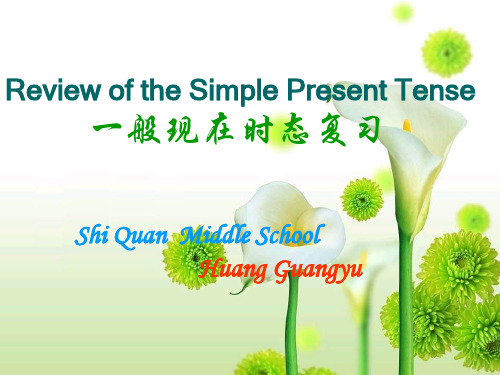
Does+主语(he/she/it)+动词原形+其他? e.g. Does he stay at home on Saturdays? Does Lucy have sports every day?
2.表经常或习惯性的动作: e.g. I get up at 6:30 every day. He reads English every morning.
3.表主语具备的性格和能力等: e.g. She likes noodles. They speak French.
4.普遍真理和自然规律: e.g. Two plus four is six. The moon goes around the earth.
否定句:主语(I/We/You/They)+do+ not+动词原形+其他 e.g. I don’t stay at home on Saturdays. They don’t have sports every day. 主语(He/She/It)+does +not+动词原形+其他 e.g. He doesn’t stay at home on Saturdays. Lucy doesn’t have sports every day.
Review of the Simple Present Tense
一般现在时态复习
Shi Quan Middle School Huang Guangyu
完整word版-初中一般现在时用法及练习
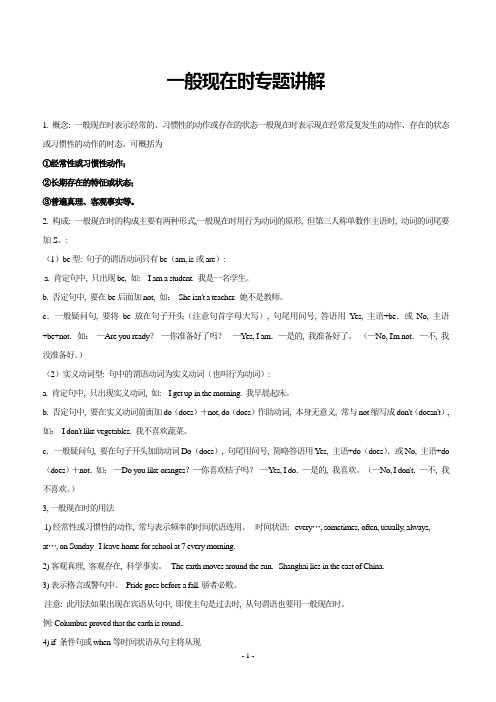
一般现在时专题讲解1. 概念: 一般现在时表示经常的、习惯性的动作或存在的状态一般现在时表示现在经常反复发生的动作、存在的状态或习惯性的动作的时态。
可概括为①经常性或习惯性动作;②长期存在的特征或状态;③普遍真理、客观事实等。
2. 构成: 一般现在时的构成主要有两种形式,一般现在时用行为动词的原形, 但第三人称单数作主语时, 动词的词尾要加-S。
:(1)be型: 句子的谓语动词只有be(am, is或are):a. 肯定句中, 只出现be, 如: I am a student. 我是一名学生。
b. 否定句中, 要在be后面加not, 如: She isn't a teacher. 她不是教师。
c.一般疑问句, 要将be放在句子开头(注意句首字母大写), 句尾用问号, 答语用Y es, 主语+be.或No, 主语+be+not.如:—Are you ready?—你准备好了吗?—Y es, I am.—是的, 我准备好了。
(—No, I'm not.—不, 我没准备好。
)(2)实义动词型: 句中的谓语动词为实义动词(也叫行为动词):a. 肯定句中, 只出现实义动词, 如: I get up in the morning. 我早晨起床。
b. 否定句中, 要在实义动词前面加do(does)+not, do(does)作助动词, 本身无意义, 常与not缩写成don't(doesn't), 如: I don't like vegetables. 我不喜欢蔬菜。
c.一般疑问句, 要在句子开头加助动词Do(does), 句尾用问号, 简略答语用Y es, 主语+do(does).或No, 主语+do (does)+not.如:—Do you like oranges?—你喜欢桔子吗?—Y es, I do.—是的, 我喜欢。
(—No, I don't.—不, 我不喜欢。
(完整版)一般现在时态讲解及练习(精简版,错题版)

一般现在时态一、一般现在时的用法1) 表示经常性、习惯性的动作或存在的状态。
通常与副词sometimes, often, usually, always, everyday (year, month ), once (twice, three times) a day, 等等频率副词(时间状语)连用。
e.g. They usually go to school by bike.I take the medicine three times a day. 实义动词表示“动作”She helps her mother once a week.Mary’s father is a policeman.There are 50 students in my class. Be动词表示“状态”He is very busy now.be 、do不能放一起,如果非要放一起,do后要加ing, 变成现在进行时。
2) 表示主语的特征、性格、爱好等。
e.g. I work hard.I like watching TV.3) 表示客观真理e.g. There are seven days in a week.The moon moves round the earth.The sun rises in the east and sets in the west every day.Tomorrow is Tuesday.二、一般现在时的句子转换:三、一般现在时的结构:“主语+谓语+其它”,有时为了起强调作用,时间状语也可提前.三单变化:1)多数在动词后+s :play — plays like — likes ask---asks work---works get---gets stay---stays 2)以字母s, x, ch, sh或o结尾的动词,+-es:watch---watches wish---wishes fix---fixes do---does go---goes pass---passes 3)以“辅音字母加- y”结尾的动词,要先变y为i+-es.try---tries study---studies cry---cries fly---flies不规则变化:be---- is are have----has做题时常见错误如下:1)、be动词与行为动词同时出现在句子中例:We are plant (plant) the trees in spring.答案:plant2)、单三人称形式易出错例:1 He plaies (play) football very well.2 Danny gos (go) to school at 7:10.答案:1 plays 2 goes解析:1以辅音字母加y结尾的动词变单三人称形式才能把y换成i再加es;2与名词变复数不同,变单三人称形式以o结尾的词要加es.3)、在句式变换时易出错例:1 Does Jenny has (has) a good friend?2 Brian doesn’t lives (not live) in China.答案:1 Does have 2 doesn’t live解析:口诀:“见助动,用原形”。
- 1、下载文档前请自行甄别文档内容的完整性,平台不提供额外的编辑、内容补充、找答案等附加服务。
- 2、"仅部分预览"的文档,不可在线预览部分如存在完整性等问题,可反馈申请退款(可完整预览的文档不适用该条件!)。
- 3、如文档侵犯您的权益,请联系客服反馈,我们会尽快为您处理(人工客服工作时间:9:00-18:30)。
特殊疑问句:疑问词+ do/does+主语+动词原形+其他?
e.g. What do you want? What does she want? What time do you have lunch? What time does she have lunch? What do you do? What does she do? How do you spell it? How does he spell it? How do you like Chinese food? How does he like Chinese food? How many tomatoes do you want? How many tomatoes does he want? How do you go to work? How does your father go to work?
Review of the Simple Present Tense
一般现在时态复习
Shi Quan Middle School Huang Guangyu
一般现在时(The Simple Present Tense)
1.表示现在的状态:
e.g. He’s twelve. She’s at work. 2.表经常或习惯性的动作: e.g. I get up at 6:30 every day. He reads English every morning. 3.表主语具备的性格和能力等: e.g. She likes noodles. They speak French. 4.普遍真理和自然规律: e.g. Two plus four is six. The moon goes around the earth.
Exercises:
对划线部分提问
1.My computer is broken. What’s wrong with your computer? 2.I’m doing my homework. What are you doing? 3.It’s Wednesday today. What day is it today? 4.His favourite sport is basketball. What’s his favourite sport? 5.My brother works in Shenzhen. Where does your brother work? 6.One of my classmates comes from Australia. Where Does one of your classmates come from? 7.Lucy usually gets up at 6:30 in the morning. When does Lucy get up in the morning?
There are some orange trees on the farm.
改为单数句子: There is an orange tree on 否定句: the farm. There are not some orange trees on 一般疑问句: the farm. Are there any orange trees on the farm? Yes, there are. 肯定回答: 否定回答: No, there aren’t. 就划线部分提问: Where are there any orange trees?
其否定句的构成
主语 + 情态动词 + not + 动词原形 + 其他
can not could not must not would not will not should not may not = can’t =couldn’t mustn’t = =wouldn’t won’t = =shouldn’t = may not
His father is an English teacher.
否定句: His father is not an English teac 一般疑问句: Is his father an English 肯定回答: teacher? Yes, he is. 否定回答: No, he isn’t. 就划线部分提问: What is his father? His father is an English teacher. 就划线部分提问: Who is an English teacher?
1、every系列
• day • year • month • week • morning • afternoon • evening
• every
2、频率副词
never
seldom
rarely
sometimes
often
usually
always
1.be 动词的一般现在时的句式: 肯定句:主语+be+表语(n., adj.等)
helps
goes
does we_____(play)football do 5.Sometimes after school. play
6.We_______ ________(not have)much work to do today. 7.____ you want ____ (be) a policeman?
don’t
have
Do
to be
改错
• 1. Is your brother speak English? • Does • 2. Does he likes going fishing? like • 3. He like playing games after class. like • 4. Mr. s Wu teachs us English. teaches • 5. She don’t do her homework on Sundays.
• 一般说来,some 用于肯定句中,any 用 于否定句和疑问句中 。
some、any
改疑问句或否定句时,原句里的some要改成any
There are some books on the desk. (改为否定句 →There aren’t any books on the desk. →Are there any books on the desk?
e.g. He is a worker. You are thirteen. They are in the classroom.
否定句:主语+be+ not+表语
e.g. He is not a worker. You aren’t thirteen. They aren’t in the classroom. e.g. Is he a worker? Yes, he is./No, he isn’t. Are you thirteen? Are they in the classroom? Yes, they are. No, they aren’t.
I have lunch at school.
否定句: I don’t have lunch at school. 一般疑问句: Do you have lunch at 肯定回答: school? Yes,I do.
否定回答: No,I don’t.
就划线部分提问: What do you do at school? I have lunch at school. 就划线部分提问: Where do you have lunch ?
doesn’ t
• • • • • • • • • • • • •
1.They like watching TV. 否定句: _______________________________ 一般疑问句:_______________________________ 肯定回答:____________________________ 否定回答:____________________________ 2.They have some friends in China. 否定句: _______________________________ 一般疑问句:_______________________________ 肯定回答:____________________________ 否定回答:____________________________ 3.I like reading books. 否定句: _______________________________ 一般疑问句: _______________________________ • 肯定回答:________________________ • 否定回答:___________________________
• • • • • • • • • • • • • • •
Байду номын сангаас
3.以辅音字母加Y 结尾的词,把Y变I 在加ES,读作 [Z]
Study
studies
fly flied
4.以辅音字母+O结尾的词,一般情况是在词尾加ES 读作[Z]
go goes do does
5.特殊情况:
have has
2.实义动词的一般现在时句式: 肯定句:主语(I/We/You/They)+实义动词+其他 e.g. I stay at home on Saturdays. They have sports every day. 主语(He/She/It)+实义动词三单现形式+其他 e.g. He stays at home on Saturdays. Lucy has sports every day. 否定句:主语(I/We/You/They)+do+ not+动词原形+其他 e.g. I don’t stay at home on Saturdays. They don’t have sports every day. 主语(He/She/It)+does +not+动词原形+其他 e.g. He doesn’t stay at home on Saturdays. Lucy doesn’t have sports every day. 一般疑问句:Do+主语(I/we/you/they)+动词原形+其他? e.g. Do you stay at home on Saturdays? Do they have sports every day? Does+主语(he/she/it)+动词原形+其他? e.g. Does he stay at home on Saturdays? Does Lucy have sports every day?
